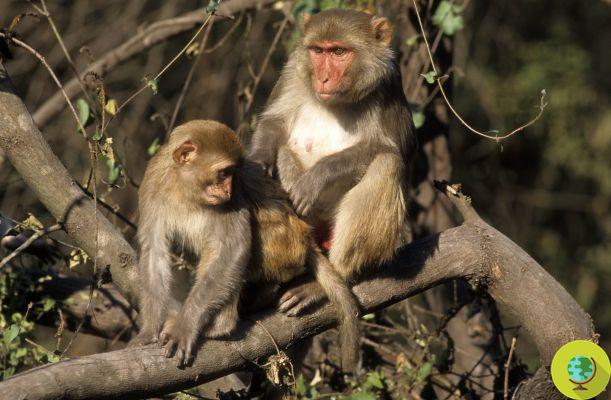
A new study conducted in the United States raises the alarm about a situation that could become a danger to public health. In fact, it seems that the wild monkeys of Florida are able to transmit the Herpes B virus (typical of macaques) also to humans.
He is about to end up run over, his mother saves him
A new study conducted in the United States raises the alarm about a situation that could become a danger to public health. It seems indeed that wild Florida monkeys are able to transmit the Herpes B virus (typical of macaques) also to humans.
A group of scientists who studied a population of rhesus macaques in Silver Springs State Park in Florida found that some monkeys are sick from the Herpes B virus. The problem is that this is present in their saliva and other body fluids. , macaques thus become a potential risk of spreading the disease even beyond their species.
What worries scientists is a particular type of Herpes, simian B virus (Macacine herpesvirus 1) or the herpes simplex virus endemic to macaque monkeys. In fact, cases of human contagion of this virus by monkeys are rare (about 50 episodes documented worldwide), however the researchers claim that the problem has not been studied in depth.
Their findings, published in the Centers for Disease Control and Prevention Emerging Infectious Diseases journal, prompted the Florida Wildlife Agency to warn that infected monkeys should be considered a real public health problem.
Following this report, state wildlife officials have taken action to seriously address the problem. It is not known how they intend to intervene but it is likely that the infected monkeys will be isolated or removed from the park in order to help reduce the threat of transmission of the virus. The herpes-B virus is in fact particularly dangerous and has proved fatal in 21 of the 50 human cases known to have contracted it from macaque bites or scratches.
"Herpes B virus infection is extremely rare in people but, when it occurs, it can cause severe brain damage or death if the patient is not treated immediately," Centers for Disease Control spokesperson Ian said in a statement. Branam.
These macaques, native to Asia, are one of Florida's many non-natural fauna species. Their contacts with the public, including last summer when the monkeys chased a family, made them known and in 2016 caused two partial closures of the park that hosts them. The monkeys have wandered several times even outside the park, many in fact the photos that testify their "walks" in the surroundings.
The presence of the virus in the urine, feces and saliva of monkeys presents problems especially for park workers but also for visitors who could be in danger if bitten or scratched by monkeys.
The Centers for Disease Control said there is always concern about the threat that diseases like the herpes B virus pose to people, especially in environments where there is frequent interaction between animals and humans. Researchers estimate that up to 30 percent of Florida's wild macaques are actively excreting the virus. It is now necessary to really understand how many monkeys are sick and how easily the disease is transmitted.
Unfortunately, macaques are not always free and happy in parks, often they are victims of experimentation on animals. In this regard, read also:
- VIVISECTION: THE 7 LABORATORY ANIMALS NOT TO FORGET
- VICTORY! OUTSIDE THE CAGES OF THE WORKSHOPS THE 16 MACACHI OF THE UNIVERSITY OF MODENA (VIDEO)
- EXPERIMENTS ON MONKEY PUPPIES: WHAT LABORATORIES DON'T WANT YOU TO SEE (VIDEO)


























